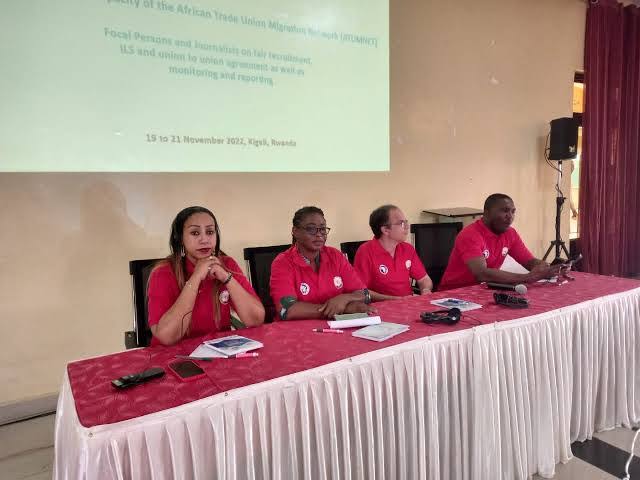By Michael Oche
Rather than continue to lament over the abuses migrant workers suffer, trade unions in Africa have resolved to become agents of the change they desire by taking more actions that will influence policies that promote the rights of migrant workers.
Our Correspondent reports that Africa, despite being a top sending continent of migrant workers, is lagging in domesticating relevant labour migration recommendations that promote fair recruitment.
The situation has been described as a major reason for continuous exploitation and abuse of rights of migrant workers of African origin, especially in Gulf Corporation Countries (GCC).
However, trade unions who are members of the African Trade Unions Network on Migration (ATUMNET) have therefore resolved to change the narrative by actively engaging in activities that celebrate the contributions of migrant workers to societal development.
These were part of resolutions reached at the end of a 3-day ATUMNET capacity building workshop for trade union focal persons on labour migration and journalists held in Kigali, Rwanda
The workshop held between December 19 – December 21 was organised by ITUC-Africa with support from the International Labour Organisation (ILO).
The workshop, which attracted journalists and labour migration focal persons from trade union organizations from different African countries, was targeted at building their capacity on result-based projects that promote fair and ethical recruitment of labour migrants, as well as end exploitation of migrants workers.
According to Comrade Joel Odigie, ITUC-Africa deputy General Secretary, the workshop was necessitated by the need to sharpen the skills and knowledge of trade unions migration focal persons to be able to increase their engagement on fair recruitment initiatives at country level “so that we can achieve the goal of better protection of the rights of migrant workers.”
He said, “Our training was focused on how to make trade unions’ engagement result-based. So, we are focusing more on result-based approaches to our work. Our expectations are very direct. We want to see outputs and outcomes that are clear, that we can celebrate. We want to see that these persons go back and begin to redesign their campaigns in a way that can help them achieve the necessary results.”
He emphasised that migrant workers are members of the trade unions constituencies and the unions will continue to advocate for policies that will protect their human and labour rights.
In his words, “as we speak today, migration discuss at the national level cannot happen without trade unions. In most countries, Trade unions are setting the pace and leading the agenda on how to achieve better labour migration governance.”
ILO Regional labour migration specialist based in ILO office in Abidjan, Coumba Diop while speaking to journalists at the end of the workshop, said the ILO is committed to building the capacity of trade unions as a social partner, to continue in their work of promoting rights of migrant workers.
She said, “One of the focus of this capacity building was to support them to report better, to report on results and not activities—the change that we want to see happening. So, we hope that they will go back home and work on advocacy campaigns, to, for example, get the ratification and domestication of labour migration conventions. Unfortunately, we are lagging behind with the ratification of recommendations that are relevant to labour migration. For Example, C181 on fair recruitment. Trade unions need to do more. They need to really carry the voices of migrant workers. We expect that after this workshop they will have all the materials and the commitment as well as the capacity to do what is necessary to advance the protection of migrants from Africa”
She emphasised that the role of trade unions is critical in advancing the voices of migrant workers
She said: “The experience here has been very positive. It is very important for the ILO to make sure we work with our social partners—government, employers, and workers organisations. We usually say that we bring our technical capacity, but they are the ones who use that capacity to make the change happen in the field. And for us, it is important to build the capacity of social partners, (in this case, the trade unions) so that they can convey the message and then make the changes in the field. When I say in the field, it is at national, subregional and regional levels.”
Ms Teresa Wabuko, the Labour migration focal person from Central Organisation of Trade unions (COTU) Kenya, while speaking on her experience at the workshop, expressed readiness to engage further with migrants workers in Kenya.
She disclosed that COTU Kenya is already setting up a migrant resource centre to allow for a more structured way of handling migrant workers issues, adding that the lessons learnt from the Kigali workshop will help in developing new strategies for protecting migrant workers in Kenya.







